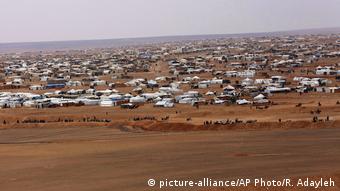World efforts to lower hunger to zero by 2030 are being negated by warfare and climate change, warn nutritionists. Their latest global index categorizes 51 nations, mainly in Asia and Africa, where hunger is alarming. The gains made since 2000 have gone into reverse, with 821 million people, many of them children, undernourished.
Data on undernourishment, child wasting, stunting and mortality, which last decade showed average improvements, began receding early last year Welthungerhilfe (World Hunger Relief) aid organization President Bärbel Dieckmann said. "And this is mainly due to war zones: where there are armed conflicts and some areas that are suffering massively from the consequences of climate change." Hunger was twice as prevalent in war-torn countries, she concluded. Drought in eastern Africa, once at 10-yearly intervals, now struck every two years. Corruption and poor governance were also factors.
Worst-placed on the GHI hunger severity index was the Central African Republic - where inter-militia conflict lingers despite a French-led UN intervention - followed by Madagascar, Chad, Zambia and war-torn Yemen.
Sixteen nations exhibiting no improvements and even regressive trends were identified in the data sets from 2016 and 2017 analyzed by the International Food Policy Research Institute, the Irish entity Concern Worldwide and Welthungerhilfe.
Child mortality and undernourishment due to insufficient calorific intake prevailed in Africa south of the Sahara. South Asia exhibited stunting and wasting among children under five, in part due to lack of essential vitamins and minerals, the report concluded.
Data on undernourishment, child wasting, stunting and mortality, which last decade showed average improvements, began receding early last year Welthungerhilfe (World Hunger Relief) aid organization President Bärbel Dieckmann said. "And this is mainly due to war zones: where there are armed conflicts and some areas that are suffering massively from the consequences of climate change." Hunger was twice as prevalent in war-torn countries, she concluded. Drought in eastern Africa, once at 10-yearly intervals, now struck every two years. Corruption and poor governance were also factors.
Worst-placed on the GHI hunger severity index was the Central African Republic - where inter-militia conflict lingers despite a French-led UN intervention - followed by Madagascar, Chad, Zambia and war-torn Yemen.
Sixteen nations exhibiting no improvements and even regressive trends were identified in the data sets from 2016 and 2017 analyzed by the International Food Policy Research Institute, the Irish entity Concern Worldwide and Welthungerhilfe.
Child mortality and undernourishment due to insufficient calorific intake prevailed in Africa south of the Sahara. South Asia exhibited stunting and wasting among children under five, in part due to lack of essential vitamins and minerals, the report concluded.
40,000 people stranded in a camp at Rukban in southeastern Syria near Jordan and close to a border triangle with Iraq.
Besieging Syrian government forces had recently cut off all roads used for aid deliveries to Rukban, said the Britain-based Syrian Observatory for Human Rights, adding that a rebel group had failed to leave the camp under a previous deal.
Relief workers said UN agencies were pressing Jordan – already burdened by past refugee influxes - to allow aid deliveries across its border to stave off suffering.
Real starvation "could explode," said the camp's civic affairs spokesman, Abu Abdullah in a phone call to Reuters.
UNICEF regional director Geert Cappelaera said the lives of thousands of children at Rukban were at risk "especially when temperatures dip below freezing point in the harsh desert conditions."


No comments:
Post a Comment